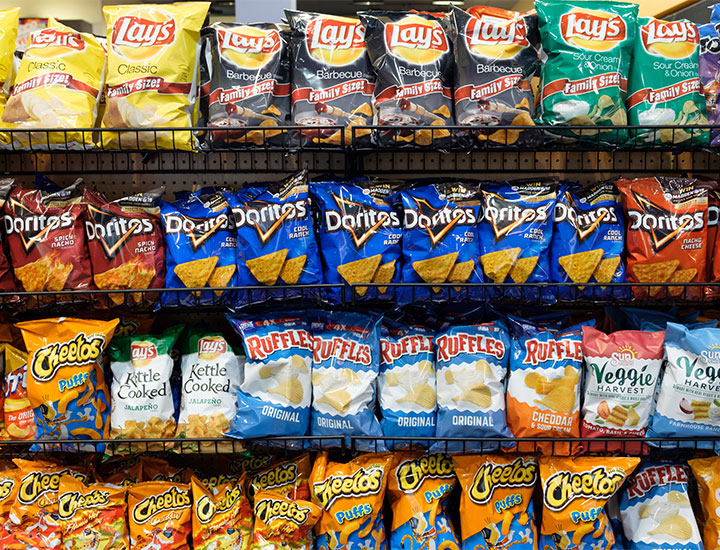
Potato Chips
The carbohydrates in refined foods, like potato chips, move through your digestive system quickly. This can lead to stomach inflammation symptoms like bloating, cramping, and gas. And, the high fat and calorie content in potato chips only increase your weight and blood sugar levels either.
"Potato chips are traditionally processed and fried with added sodium or artificial flavors," Best says. "The consumer may also use [high-fat] dips or cheeses when eating them and is likely to mindlessly eat them without noticing the quantity." This can lead to stomach inflammation and excess visceral fat!
Dr. Lee adds, "If you eat a few chips, the calories really don’t add onto the waistline." But let's be real: We almost always eat a handful, amirite? And because of the added salt, there's a possibility that your mouth will feel dry and dehydrated. She continues, "The sense of thirst and food cravings are pretty similar psychologically, so a lot of people don’t grab a bottle of water to quench a thirst but may find themselves eating more food, hence calories that could be stored."
Similarly, Richards warns, "Potato chips are also generally made from refined carbohydrates that have been fried. This adds excess carbs, fat, and sodium into your diet." Yikes! Overall, potato chips are high in calories but low in nutritional value. They don't satiate us in the same way that low-calorie but nutrient-dense foods that are high in fiber and water do. So, it's better to just ditch the potato chips and instead opt for healthier snacks like apple slices and nut butter.
Donuts
There's no denying that sugar is delicious (not to mention addicting), but unfortunately, it’s also terrible for your overall health–especially when it comes to age-related diseases. While there are tons of unhealthy processed foods out there, donuts are among the worst because they are both fried and high in refined sugar.
Sugar and high fructose corn syrup can be especially damaging to your gut health and can cause inflammation in the stomach. "Sugar and high fructose corn syrup are very inflammatory foods that can also cause bloating and digestive issues such as irritable bowel syndrome," Moretti notes. She emphasizes that these ingredients "can cause unwanted bacteria to overgrow and produce gas in the gut, causing bloating and distress." No one wants that!
3. High sodium canned foods
Canned soups and ready meals are oftentimes highly convenient—and even tasty. Unfortunately, though, Dr. Patel warns that they can lead to stomach inflammation and more due to their high sodium content. "Many canned foods, particularly soups and ready-to-eat meals, contain high levels of sodium and preservatives," he says. While these convenient options may seem like a time-saving solution, their high sodium content can spell trouble for your health.
Excessive sodium intake isn't just a concern for your taste buds; it can also wreak havoc on your body. Dr. Patel explains, "Excessive sodium intake can lead to high blood pressure, cardiovascular issues, and cellular damage." Moreover, the preservatives found in canned foods can further compound these issues, contributing to inflammation and oxidative stress within the body.
Regular consumption of high-sodium canned foods can set the stage for a host of health problems, from inflammation to an increased risk of chronic diseases. This inflammation not only affects your stomach but can also impact other vital organs and systems, accelerating the aging process and diminishing overall well-being.
All in all, it's essential to prioritize whole, unprocessed foods over their canned counterparts. By opting for fresh, whole ingredients, you can nourish your body with essential nutrients while minimizing the harmful effects of excessive sodium and preservatives. Making mindful choices about the foods you consume can pave the way for a healthier, more vibrant life in the long run.
So, there you have it: experts say that potato chips. donuts, and canned foods are among the worst processed foods for an inflamed stomach. We understand that cutting out all processed foods can be extremely difficult considering how many foods are considered processed. But in the grand scheme of things, it's best to limit your intake as much as possible if you want to reduce bloating, cramping, gas, and weight gain.


